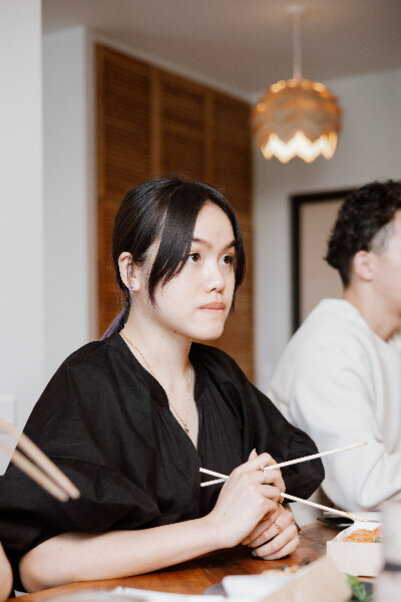Making small talk with people whom you’ve just met. Asking for help from a shop assistant. Arriving late to a quiet meeting room filled with strangers. Undergoing these seemingly ‘ordinary’ experiences can be quite a feat if you are shy or have social anxiety. Is there a difference between the two? Is it possible to overcome shyness? We checked in with Psychology Blossom’s clinical psychologist Jae-Mie Yiew to learn more.
It’s easy to mistake one for the other
“There is some overlap between feeling shy and social anxiety disorder when it comes to behaviour. Those who have social anxiety or shyness may be uncomfortable being the centre of attention or hesitate to open up in social situations. As a result, social anxiety disorder might be mistaken for shyness,” revealed Jae-Mie.

In social situations, individuals with social anxiety disorder remain fearful of saying something they deem to be embarrassing. (Photo from: John Diez via Pexels)
However, the psychology expert clarified that the key difference between the two is as such: “Shyness often eases once you feel comfortable with the situation, while individuals with social anxiety disorder stay fearful of saying or doing something they deem to be humiliating or embarrassing. Therefore, they tend to either avoid or endure their most feared situation with feelings of intense distress.”
Hence, if you find yourself requiring a little more time to adjust to social situations, you may just be feeling shy and that’s all right. Otherwise, if you find yourself experiencing great difficulty in managing social situations, it may be helpful to seek advice from a mental health professional.
What are the tell-tale signs of social anxiety?
A person with social anxiety would exhibit symptoms such as “blushing, sweating and shaking” when they are faced with social situations, shared Jae-Mie. But beyond these behaviours, professionals may utilise various psychological assessments to help them form a more accurate diagnosis.
In Jae-Mie’s practice, she administers the Brief Fear of Negative Evaluation Scale (BFNE) and the Liebowitz Social Anxiety Scale (LSAS) to determine if a person has social anxiety. Both tools are presented in the form of a questionnaire, which requires respondents to share how they would react to various social situations.
Are shyness and social anxiety hereditary?
The short answer’s yes. But there’s much more to this than just your DNA.
Indeed, studies have shown that a person can have a genetic tendency to be naturally shy. The same goes for those with social anxiety as well. “Although there isn’t a particular gene [that is] linked to social anxiety disorder, it can still be heritable,” shared Jae-Mie. She revealed that an individual may be “two to six times” more likely to develop social anxiety disorder if a direct family member has social anxiety disorder as well.
Genetics aside, research also indicates that environmental factors have a “significant role” in the onset of the condition, added Jae-Mie. Furthermore, several different psychological and social factors can also cause a person to develop social anxiety.
How so? Jae-Mie explains: “Personality traits such as behavioural inhibition cause individuals to react to novel situations with distress and nervousness. This can then be exacerbated by parents who model fear and avoidance in social situations as well as overprotective parenting, or stressful social situations such as being bullied and public embarrassment.”
Social anxiety: It’s more than just the fear of public speaking
While public speaking can be an incredibly nerve-wracking experience for those with social anxiety, individuals who are diagnosed with this disorder may also feel distressed in less ‘public’ settings.
According to Jae-Mie, talking to someone in authority can also be challenging for them. Furthermore, having social anxiety may also affect “everyday events like eating or working in front of others.” They can also find it especially tough to be assertive or express their disagreement.
The only way through is through
When it comes to managing social situations, you may initially feel shy, nervous and uncomfortable to the extent that you’d wish to remove yourself from the situation altogether. However, Jae-Mie suggests that the best way to overcome your shyness is to “face these challenges.” This way, you’ll be better equipped in reducing your anxiety when you’re exposed to similar feared situations again. You’ve got this!
Quick tips on managing tricky social situations
Jae-Mie indulged us in a round of quickfire questions on how we can overcome the following common yet tricky social situations too. Here are her tips.
Presenting a speech to a 100-strong audience?
Jae-Mie (J): “Learn and practise relaxation techniques such as deep breathing or body scan when preparing for your speech. This will help manage any uncomfortable physical sensations caused by your anxiety and fear.”
Attending a business networking event?
J: “Create a list of goals that you want to accomplish by attending the event. For example, prepare a list of questions you want to ask or set a fixed number of people you want to approach. Having a clear mindset of what you want to achieve may distract you from feeling nervous.”

Feeling anxious about dining alone? Challenge yourself by starting with something small like a coffee or dessert. (Photo from: Artem Podrez via Pexels)
Eating alone in a restaurant?
J: “If you can’t picture yourself eating alone just yet, try to challenge yourself by starting with something small like a coffee or dessert instead of a main. With time and graded exposure, you can work yourself up to feeling more comfortable in the future.”
Going on a blind date?
J: “Dating can be anxiety-provoking, causing you to be distracted from your current experience and preventing you from being your true self. Allow yourself to be mindful during the date and keep your mind focused on the present. Most importantly, go on the date with the intention to have fun and enjoy the experience.”
(Cover photos from: John Diez via Pexels and Artem Podrez via Pexels)
Next, discover how mental health experts take care of their mental health.
Comments, questions or feedback? Email us at [email protected].








